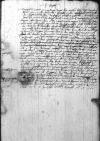Uns sein gestrigs tags bey unserm(m) botn(n) disse beygebund(en) brive an E(wer) H(erlichkei)t geworden(n), beyde mit welchen uns hoth der hochwirdig her ⌊bischoff zu Ploczko⌋ etc. geschribn(n), E(wer) H(erlichkei)t anzuzceig(en), das die seiner lieb(en) briff durch einen gancz vortrawten sich wolde lassen vor lesen, / dem E(wer) H(erlichkei)t wol wirt wissen zu thun. / Es hoth uns ouch abermols ⌊sein lieb⌋ der lismanschn(n) sache befoln(n), / von(n) der uns der h(er) ⌊danczker castellan⌋ negst superinscribed⌈negstnegst superinscribed⌉ geschribn(n), / das er sich vorhofft, es mochte zum vortrage komen(n) etc. Von ⌊Rom⌋ schreibt uns unser ohme, h(er) ⌊Casper Hannow⌋, das er den XXX Maii vorschinen(n) ... illegible⌈...... illegible⌉ alle brive, / instrume(n)ta und was zu E(wer) H(erlichkei)t ⌊sones⌋ sache gehorig / mit gemitlichem underricht, / wie darinnen gehandelt sold werden, / hab abgeschickt, / des uns keins ist ... illegible⌈...... illegible⌉ zukomen(n). / solchs alles acht wir, das es bey ⌊Wolff Ruprechten(n)⌋, der ⌊Fugger⌋ diner zu ⌊Thorn(n)⌋ sein(n) mues, / dan ⌊Jorg Hegel⌋ hot uns geschribn(n) Ob E(wer) H(erlichkei)t ⌊son⌋ derweg(en) et superinscribed in place of crossed-out E(wer) H(erlichkei)t⌈E(wer) H(erlichkei)t et et superinscribed in place of crossed-out E(wer) H(erlichkei)t⌉was heth zugeschribn(n), / wold uns mitteilen(n). Von(n) zceitung(en) ist nicht sonders an uns gebrocht, / wie disser eingelegt on the margin⌈eingelegteingelegt on the margin⌉ zcedel inhelt, / do nebn(n) ouch, das ⌊kay(serlich)e m(ajeste)t⌋ seine houptleut aus ⌊Welsschenland⌋ mit dem ⌊margraff(en) zu Guasto⌋ mit einer grossen anzcal volks zu ross und fues beyeinander hoth / im willen, der kirchen abtrunnigen ⌊erczbischoff⌋ zu ⌊Coln(n)⌋ ins erst und darnoch andre, die von(n) unser superinscribed⌈erer superinscribed⌉ cristlichen(n) gemeinschafft gefallen, / zu uberzcyhen(n). / Got fuege alles seinen(n) gotlichen ehren on the margin⌈ehrenehren on the margin⌉ und seiner heilig(en) kirchen zum besten(n). / Ouch hore wir hie, / das f(urstliche) d(urchlauch)t ... illegible⌈...... illegible⌉ in die Marke zum ⌊kurfurst(en) zu ⌊Brandenburg⌋⌋ disse tage sich zu begebn(n) habe vorgenomen(n) etc. So E(wer) H(erlichkei)t hie von was vornomen(n), / ouch was sonst ... superinscribed⌈ ... illegible⌈...... illegible⌉ ... superinscribed⌉ E(wer) H(erlichkei)t heth und newes on the margin⌈E(wer) H(erlichkei)t heth und newesE(wer) H(erlichkei)t heth und newes on the margin⌉ derselbt(en) von hove ist zugeschribn(n), / fruntlich bitt(en), uns mitzuteilen(n). Die wir hiemit gotlichn(n) gnad(en) in aller seligheit befelen(n).

 AAWO, AB, D. 7, f. 57r
AAWO, AB, D. 7, f. 57r